|
|
|
Sort Order |
|
|
|
Items / Page
|
|
|
|
|
|
|
| Srl | Item |
| 1 |
ID:
103315
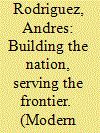

|
|
|
|
|
| Publication |
2011.
|
| Summary/Abstract |
The wartime period between 1937 and 1945 provided an exceptional opportunity for the Guomindang state to experiment with a wide array of schemes that sought to further its nation-state project in the borderland regions of China. Under the rubric of 'frontier reconstruction' (bianjiang jianshe) it devised a series of plans that encompassed both the economic and cultural transformations of these regions. This paper discusses a particular scheme devised by Chinese anthropologist, Li Anzhai (1900-1985), during his stay at the Tibetan Buddhist monastery of Labrang where he sought to transform borderland societies into a modern Chinese citizenry. A key aspect to his strategy was the mobilization of youth where trained cadres and students performed what became known as 'frontier service' (bianjiang fuwu) establishing a dialogue with the community's own particular demands by means of building schools, hospitals and agricultural projects. This paper argues that the notion of 'frontier service' and the 'cultural reconstruction' project propounded by Li not only sought to modernize and unify China around a distinct multicultural identity, it was also an important mobilizing force amongst sectors of wartime youth which arguably introduced young Han Chinese to a region which they had hitherto only imagined in the pre-war period.
|
|
|
|
|
|
|
|
|
|
|
|
|
|
|
|
| 2 |
ID:
103309
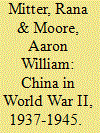

|
|
|
|
|
| Publication |
2011.
|
| Summary/Abstract |
China's long war against Japan from 1937 to 1945 has remained in the shadows of historiography until recently, both in China and abroad. In recent years, the opening of archives and a widening of the opportunity to discuss the more controversial aspects of the wartime period in China itself have restored World War II in China ('the War of Resistance to Japan') to a much more central place in historical interpretation. Among the areas that this issue covers are the new socio-political history of the war that seeks to restore rationality to the policies of the Guomindang (Nationalist) party, as well as a new understanding in post-war China of the meaning of the war against Japan in shaping Cold War and post-Cold War politics in China. In doing so, it seeks to make more explicit the link between themes that shaped the experience of World War II in China to the war's legacy in later politics and the uses of memory of the conflict in contemporary Chinese society.
|
|
|
|
|
|
|
|
|
|
|
|
|
|
|
|
| 3 |
ID:
103320


|
|
|
|
|
| Publication |
2011.
|
| Summary/Abstract |
This paper explores the unusually weak voice of Chinese war veterans in post-1949 politics society and culture. Although Chinese movies and television often feature military-related themes, it is rare to find frank and politicized depictions of China's military conflicts. In this respect, China departs sharply from the former Soviet Union-China's Leninist model for most of its formative years-as well as Vietnam, European inter-war fascist regimes and democracies. This paper argues that the relative weakness of authentic military voices in China can be traced to several peculiar features of modern Chinese history. The nature of warfare in China, as well as the absence of a national army, veteran organizations and a consensus over the legitimacy about China's wars, has led many to question the validity of veterans' claims for a higher political and cultural status. Rather than allow veterans the space to portray war as they experienced it, intellectual elites in various cultural and propaganda offices dominate national war memory, presenting a simplistic and artificial rendering of China's wars.
|
|
|
|
|
|
|
|
|
|
|
|
|
|
|
|
| 4 |
ID:
103311


|
|
|
|
|
| Publication |
2011.
|
| Summary/Abstract |
This paper argues that the first phase of the Sino-Japanese War of 1937-1945 saw a significant change in the relationship between state and society in China, leading to a greater use of techniques of classification of the citizenry for purposes of welfare provision and mobilization through propaganda, methods until recently more associated with the Communists than with their Nationalist rivals. The paper draws on materials from Sichuan, the key province for wartime resistance, showing that the use of identity cards and welfare provision regulations were part of a process of integrating refugees from occupied China into the wider wartime society, and that propaganda campaigns were deployed to persuade the local indigenous population to support wartime state initiatives. Although Nationalist efforts to mobilize the population in wartime were flawed and partial, they marked a significant change in the conception of Chinese citizenship.
|
|
|
|
|
|
|
|
|
|
|
|
|
|
|
|
| 5 |
ID:
103319


|
|
|
|
|
| Publication |
2011.
|
| Summary/Abstract |
This paper examines the role that veterans played in the construction of historical memory narratives in mainland China, Taiwan, and Japan. I argue that veterans, who had long established a 'language community' with a particular way to speak about the war, found it difficult to communicate with post-war audiences that did not share that experience. The paper analyses six categories of 'memory writing' that veterans used to engage with memory debates: post-war diaries, 'testimonial literature', articles and literary works, surveys and oral histories, memoirs, and paratext. This study thus proposes that veterans do not avoid discussion of war, but can only be 'heard' by members of their language community, or by a post-war society that is prepared to 'listen' to their message with little mediation. This is a direct consequence of their experience of the war, and how they crafted their language community at that time.
|
|
|
|
|
|
|
|
|
|
|
|
|
|
|
|
| 6 |
ID:
103314
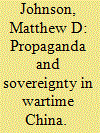

|
|
|
|
|
| Publication |
2011.
|
| Summary/Abstract |
During the later years of the War of Resistance to Japan (1937-1945), United States (US) propaganda activities intensified in both Japanese military-occupied and 'free' regions of China. One of the most important organizations behind these activities was the Office of War Information (OWI). This paper examines the OWI, and particularly its Overseas Office, as key institutional actors within a broader US total war effort which touched the lives of civilian populations in East Asia as well as combatants, arguing that:
|
|
|
|
|
|
|
|
|
|
|
|
|
|
|
|
| 7 |
ID:
103321
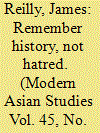

|
|
|
|
|
| Publication |
2011.
|
| Summary/Abstract |
Chinese leaders have repeatedly insisted upon the contemporary relevance of the 'War of Resistance to Japan' (1937-1945). However, the content of the official history of the war and the lessons drawn from it have changed dramatically from 1949 through 2010. This paper begins by reviewing theories of collective remembrance and then covers four historical periods: China's 'benevolent amnesia' on Japan's wartime atrocities before 1982; China's patriotic education campaign from the mid-1980s; the rise of history activism in China in the late 1990s; and the post-2005 reversal in official rhetoric on Japan and the wartime past. It concludes that, while the party-state retains an impressive capacity to shape the narratives of critical periods of modern Chinese history, Chinese leaders are likely to find themselves increasingly constrained by domestic forces and by external events beyond their control.
|
|
|
|
|
|
|
|
|
|
|
|
|
|
|
|
| 8 |
ID:
103312
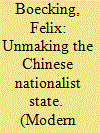

|
|
|
|
|
| Publication |
2011.
|
| Summary/Abstract |
The defeat of the Chinese Nationalist Party (Guomindang) in the Chinese Civil War in 1949 is often explained as a consequence of Nationalist fiscal incompetence during the Second Sino-Japanese War, which led to the collapse of the Nationalist state. In this paper, I argue that from 1937 until 1940, GMD fiscal policy managed to preserve a degree of relative stability even though, by early 1939, the Nationalists had already lost control over ports yielding 80 per cent of Customs revenue which, during the Nanjing decade (1928-1937), had accounted for more than 40 per cent of annual central government revenue. The loss of this revenue forced the Nationalists to introduce wartime fiscal instruments, taxation in kind, and transit taxes, both previously condemned as outdated and inequitable by the Nationalists. Further territorial losses led to the introduction of deficit financing, which in turn became a cause of hyperinflation. The introduction of war-time fiscal instruments led to administrative changes in the revenue-collecting agencies of the Nationalist state, and to the demise of the Maritime Customs Service as the pre-eminent revenue-collecting and anti-smuggling organization. The administrative upheavals of the war facilitated the rise of other central government organizations nominally charged with smuggling suppression, which in fact frequently engaged in trade with the Japanese-occupied areas of China. Hence, administrative reforms at a time of fiscal collapse, far from strengthening the war-time state, created one of the preconditions for the disintegration of the Nationalist state, which facilitated the Chinese Communist Party (CCP) victory in 1949.
|
|
|
|
|
|
|
|
|
|
|
|
|
|
|
|
| 9 |
ID:
103317


|
|
|
|
|
| Publication |
2011.
|
| Summary/Abstract |
n today's China, public memory of the War of Resistance against Japan, 1937-1945, is more visible than ever. Museums, movies, television programmes, and commemorations focus heavily on the victimization of the Chinese people at the hands of the Japanese invaders. Japanese atrocities, particularly the Nanjing Massacre, are at the centre of much of this remembering. But what of the wartime period? How did journalists and writers discuss Japanese atrocities? This paper finds that most wartime writing stressed the theme of 'heroic resistance' by the Chinese rather than China's victimization at the hands of Japanese. Exceptions to this approach included efforts to publicize Japan's action to Western audiences in the hope of gaining support for China's cause, and a related focus on the bombing of the civilian population by the Japanese. This paper suggests major differences between the current approach to remembering the war and to writing during the war itself.
|
|
|
|
|
|
|
|
|
|
|
|
|
|
|
|
|
|
|
|
|